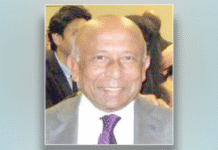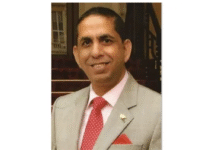Sadeq Khan
Conflicting signals are emanating from the Indian Security State, which seems to be undergoing discreet “Modi-fication” after change of guards in Delhi last May. Sonia Gandhi-Sheikh Hasina family camaraderie and dynastic bondage, perceived to be the bulwark of unassailability of Sheikh Hasina’s continuing government “declared elected” last January, may have suffered subsidence.
From within her own camp (like her former Planning Minister AVM A.K. Khondakar writing a book questioning her father’s commitment to actual liberation, or one of her-party’s Dhaka Mayoral aspirant Mahmudur Rahman Manna formally reneging allegiance to join a distinguished, older renegade of her party, once her father’s trusted foreign minister Dr. Kamal Hossain to form a ‘fifth column’ of opposition’, Lilliput prickles are being hurled at the soft belly of her time-tested rhetoric. The 20-party opposition alliance leaders are again demonstrating capacity to draw massive protest crowds, although unable to hide exhaustion from police hunts and gang cases since their effective countrywide January 5 election boycott without results. All that did not matter. But the equanimity of Sheikh Hasina regime in Dhaka now happens to be patently disturbed by conflicting signals from the Red Fort of Indian Security State.
MJ Akbar’s Dhaka visit
On September 1, distinguished Indian journalist M.J. Akbar, once close to Indira Gandhi scions and now made national spokesman of India’s ruling party BJP, came to Dhaka for a four-day visit, his arrival unannounced by the Indian High Commission. The High Commission’s special wing connected with Indian Security establishment arranged for a “private” meeting of MJ Akbar with representatives of former prime minister and leader of the 20-party opposition alliance, Khaleda Zia. The relevant officials of the Indian High Commission, i.e. the continuing appointees of the Research and Analysis Wing (RAW) of Indian Prime Minister’s office from Dr. Manmohan Singh’s time, were however not taken into confidence about the contents and results of that meeting.
High Commission, M.J. Akbar in a television interview declared that unlike its predecessor government, the BJP government in India will maintain good relations with “all political parties in Bangladesh, not excluding Jamat.
On September 3, the Times of India, known to genuinely reflect the thinking of the Indian Security State, published a news analysis on India-Bangladesh ties. Referring to the Border Guard-Border Security forces meeting at Director General level in Delhi in which the Border Guards of Bangladesh agreed to send its men for “training” in India and got no solid assurance of cessation of “killing fields” practice of Indian BSF who shoot at Bangladeshis at the border fences at random to terrorise and dissuade “suspect” traffic, the newspaper reported: “India expectedly raised the issue of illegal immigration and asked its South Asian neighbour to take concrete steps to evict insurgents of northeastern Indian origin hiding in the latter’s territory and to check the cross-border movement of smugglers and illegal migrants. The two nations have signed a series of agreements and memoranda of understanding to manage the unresolved border issues. Illegal immigration and rampant smuggling along the border, besides insurgency are security issues that have dominated Indo-Bangladesh border talks for long, and analysts feel talks really don’t have any bearing for a future resolution.”
Delhi’s Dhaka policy revision
The newspaper then went on, amongst other things, to comment as follows:
“Should India continue to accept false pretensions and promises made by the Sheikh Hasina-led Awami League? Perhaps, India’s foreign policy in relation to Bangladesh needs a revisit.
“Back in 2011, there was hardly any cheering in Dhaka when the country prepared to mark 40 years of independence. The masses were not roused enough, and it was reported to be, in part, a reaction to the Awami League’s efforts to commandeer the nation’s history for fleeting political goals. There is mass scale alienation, made much more prominent after the controversial electoral process in January 2014. Analysts say people of Bangladesh feel India could have done more as it is a more resourceful nation, but has fallen short of people’s expectations. Recent developments in the region potentially spell trouble for India too. India is likely to closely watch as Sheikh Hasina bolsters ties with Beijing to repair dented legitimacy after the U.S. and Europe raised question marks over her authority to form the government under controversial circumstances.
“The two countries (Bangladesh and China) signed a memorandum of understanding on the creation of a Chinese economic and investment zone in Chittagong, Bangladesh’s main deep-sea port, and discussed construction of a highly anticipated second port at Sonadia, a tiny island in the Bay of Bengal Sea. Sonadia may emerge as a major regional trade hub, as it provides sea access to China’s Yunnan province, India’s landlocked northeastern states, the Himalayan nation of Nepal, and Bhutan. If China is granted Sonadia’s deep-sea port project, it will gain “further access to the Indian Ocean and an alternative route for its energy imports. Experts believe China is involved in a ‘shadow war’ through enhancing Bangladesh’s military and naval infrastructure for countering the US and India in the Indian Ocean Region.
Delhi’s trust gap widened
“A 2014 report by the Stockholm International Peace Research Institute states that China was the biggest supplier of arms to Bangladesh between 2009 and 2013. The report has claimed that Bangladesh bought anti-ship missiles, tanks, fighter aircraft and other arms from China, resulting in China being the source for 82 per cent of Bangladesh’s total arms imports during the period. Analysts say Sheikh Hasina’s recent high-profile visit to Beijing, in which she pledged to be an active partner in a China-led century, is bound to affect her country’s relationship with India. Such diplomatic manoeuvres will not go unnoticed by the Narendra Modi regime in New Delhi, which has already indirectly questioned China’s alleged expansionist designs. Bangladesh, it appears, has already picked sides, and India is likely to be sceptical of its future affiliation with its South Asian neighbour.
“Unless a concrete road map is devised, India must tread with caution in dealing with the Awami League Government in Bangladesh.”
On the same day late in the evening (after the end of the luncheon meeting between Indian BJP spokesman M.J. Akbar and BNP representatives authorised by Khaleda Zia), the Security State of India was quoted by the India correspondent of a Bangladeshi on-line news agency ‘bdnews24.com’ to spin what appears to be a sop to Sheikh Hasina’s bothered power elite in Bangladesh.
The on-line report read: “Indian intelligence officials say they have unravelled a US-funded move to topple Sheikh Hasina’s government in Bangladesh and ‘weaken’ the Left regime in Tripura. West Bengal’s ruling party Trinamool Congress, which is said to have been hugely funded by the US in its oust-Left drive in West Bengal between 2009-2011, has transferred millions of dollars to its fundamentalist associates in Bangladesh, they claim.
“Trinamool MP in Rajya Sabha Ahmed Hassan Imran and another Maulana Asif Khan (originally from Teknaf) have been sending huge amounts of money to the Jamaat-e-Islami and BNP over the past six months.
New twist in propaganda
“The BNP and Jamaat leaders have been meting out threats and pushing for a fresh election, almost in tandem with the US. Pakistani agencies are also involved. The Pakistani high commissioner met West Bengal Chief Minister Mamata Banerjee and sought her support to open a deputy high commission in Kolkata to facilitate Pakistani visas to Muslims in the city. Indian intelligence officials are opposed to the proposal and somewhat amazed at the ‘bonhomie’ between the Pakistani diplomats and Mamata Banerjee who seems to be going out of her way to secure the Urdu-speaking Muslim vote.
“One source points out that a leading Indian editor belonging to this community, who has recently joined the BJP, is now in Dhaka to ‘liaise’ closely with the BNP. One businessman from the community is helping him set up links between the BJP and the BNP. This businessman claims he works for RAW.
But many senior BJP leaders are upset at the activity of this editor and author because they say he is actually lobbying for the BNP in his own party circles: ‘Prime Minister Modi is keen to deal with the present government but this Muslim editor-journalist seems to have taken it upon himself to forge strong BNP-BJP ties.’
“Ahmed Hassan Imran, who was nominated to Rajya Sabha by none other than Mamata Banerjee, was actually a senior office bearer of the now-banned Students Islamic Movement of India (SIMI).
“Imran was a correspondent of the Jamaat’s mouthpiece Naya Diganta and enjoys close personal relations with leaders like Motiur Rahman Nizami, Delwar Hossain Sayedee and Mir Quasem Ali, all of whom are up in the dock on the war crimes trials. Pakistan is strongly lobbying with other powerful Islamic countries like Saudi Arabia to force the Bangladesh government to stop the war crimes trials.
US ‘rubbished’ the report
“US is backing the Jamaat-BNP combine because it has been promised a base in the Bay of Bengal in case they come to power, possibly in the Saint Martin’s Island.
“The US is keen on this base to oversee the Chinese-developed port facility at Kyaukpyu in Myanmar’s Rakhine province and the proposed Sonadia deep-sea port in Bangladesh. The (Indian) intelligence report says that the US is not only keen to bring down Sheikh Hasina government but also cripple the Left regime in Tripura with the ultimate purpose of ousting it in an operation akin to West Bengal in 2011.”
The US embassy in Bangladesh promptly “rubbished” the report quoting Indian intelligence sources that American agencies hatched a plot to oust Bangladesh Prime Minister Sheikh Hasina (Press Trust of India, September 4). The spokesperson of the US Embassy in Dhaka Monica Shie in an e-mailed response to the report further pointed out: “As you know, the United States and Bangladesh enjoy a strong friendship and close cooperation on a wide range of issues including countering violent extremism, building our trade relationship while improving worker safety, and enhancing regional economic engagement.
“Just this week, the United States was proud to announce that we officially offered the United States Coast Guard Ship (USCGS) Rush to Bangladesh on Aug. 8. The Rush will complement the Somudra Joy, which was transferred to the Bangladesh Navy last year.
“We look forward to further broadening and deepening our bilateral relations at our annual Partnership Dialogue, scheduled for October in Washington, DC.”
The Indian security establishment quoted in the report did not contradict the report by any response from any quarter.
Source: Weekly Holiday









